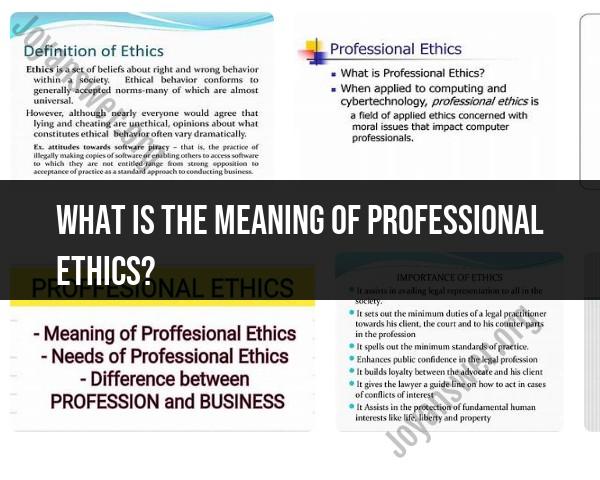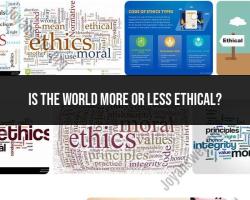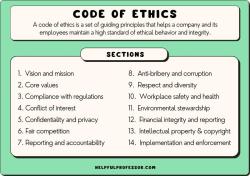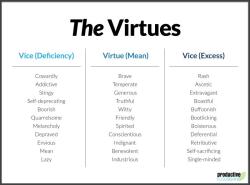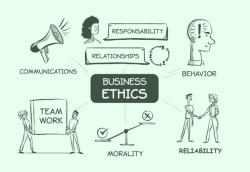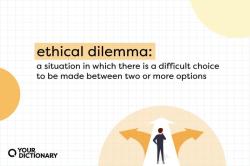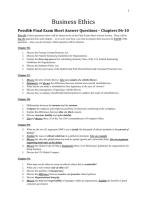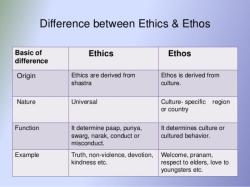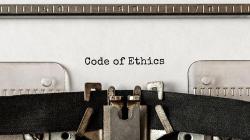What is the meaning of Professional Ethics?
Professional ethics refers to the moral principles, values, and standards of conduct that guide the behavior of individuals in a specific profession. These ethical guidelines are designed to ensure that professionals act with integrity, responsibility, and accountability in their interactions with clients, colleagues, the public, and other stakeholders. Professional ethics help maintain trust, uphold the reputation of the profession, and protect the well-being of those affected by professional activities.
Key aspects of professional ethics include:
Code of Conduct:
- Professions often have a formalized code of conduct or a set of ethical guidelines that outline the expected behavior of professionals in that field. These codes typically cover a range of issues, including honesty, confidentiality, conflicts of interest, and respect for diversity.
Integrity:
- Integrity is a fundamental principle of professional ethics. Professionals are expected to be honest, truthful, and transparent in their actions and communications. They should avoid engaging in deceptive practices or misleading behaviors.
Confidentiality:
- Many professions require practitioners to maintain confidentiality regarding sensitive information obtained during the course of their work. This ensures that clients can trust professionals with private and confidential matters.
Professional Competence:
- Professionals are expected to possess the necessary knowledge, skills, and expertise to perform their duties competently. Continuing education and professional development are often encouraged to stay current in the field.
Impartiality and Fairness:
- Professionals should treat all individuals fairly and impartially, avoiding discrimination or favoritism. Objectivity and fairness in decision-making contribute to the credibility of the profession.
Conflict of Interest:
- Professionals must avoid situations where personal interests or relationships could compromise their professional judgment or create a conflict between personal and professional responsibilities.
Responsibility to Clients and the Public:
- Professionals have a responsibility to act in the best interests of their clients or the public they serve. This includes providing accurate information, avoiding harm, and prioritizing the well-being of those affected by their actions.
Accountability:
- Professionals are accountable for their actions and decisions. If mistakes are made, professionals are expected to take responsibility for rectifying errors and learning from the experience.
Adherence to Laws and Regulations:
- Professionals must comply with relevant laws, regulations, and professional standards. Ethical conduct often goes hand in hand with legal compliance.
Social Responsibility:
- Some professional ethics codes emphasize the broader societal impact of professional activities. This involves considering the environmental, social, and ethical implications of decisions and actions.
Professional ethics vary across different fields, and each profession may have its own specific ethical guidelines. For example, medical professionals adhere to medical ethics, legal professionals follow legal ethics, and engineers observe engineering ethics. Adherence to professional ethics not only safeguards the interests of clients and the public but also contributes to the overall credibility and trustworthiness of the profession.
What defines the concept of Professional Ethics in various industries?
The concept of Professional Ethics, while sharing core principles, takes on specific nuances and emphasis depending on the industry in question. Here's a glimpse into how Professional Ethics manifests in different fields:
Medicine:
- Patient confidentiality is paramount, including upholding medical records privacy.
- Informed consent ensures patients understand procedures and make informed decisions.
- Do no harm remains the guiding principle, balancing benefits and risks of treatment.
- Whistleblowing on unethical practices is encouraged to protect patient safety.
Law:
- Upholding the law and justice system guides every decision and action.
- Client confidentiality is essential, with exceptions only in specific legal instances.
- Avoiding conflicts of interest ensures impartial representation and justice.
- Maintaining impartiality and integrity are crucial even in adversarial proceedings.
Business:
- Fair and honest dealings with clients, colleagues, and competitors are expected.
- Transparency in financial reporting and business practices builds trust.
- Corporate social responsibility considers environmental and social impact alongside profit.
- Sustainable practices and ethical sourcing are increasingly valued.
Engineering:
- Public safety is the top priority, prioritizing quality and responsible project management.
- Adherence to safety regulations and standards ensures product and infrastructure integrity.
- Environmental considerations are crucial in design and development processes.
- Whistleblowing on safety concerns is encouraged to prevent potential disasters.
Education:
- Maintaining trust and integrity while interacting with students and parents.
- Fair and objective assessment ensures unbiased academic evaluation.
- Protecting student privacy and confidentiality is crucial.
- Avoiding conflicts of interest in research and academic conduct.
These are just examples, and the specific nuances of Professional Ethics within each industry are vast and complex. Codes of conduct, industry regulations, and professional organizations further define and enforce ethical standards for each field.
Ultimately, Professional Ethics transcends industry boundaries, emphasizing integrity, respect, responsibility, and accountability in all professional interactions. Understanding and upholding these principles builds trust, ensures responsible practices, and contributes to a more ethical and sustainable world.
I hope this gives you a broader perspective on how Professional Ethics takes shape in diverse industries. Feel free to ask if you have any further questions about specific fields or ethical dilemmas!
